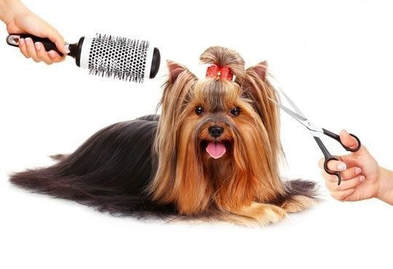Brushing your Yorkie or Morkie properly is Very Important. Please watch this video below. She does an awsome job on showing how to do it the right way!

How to Groom Your Yorkshire Terrier
By Tracy Barr and Peter F. Veling from Yorkshire Terriers For Dummies
Keeping your Yorkie well-groomed is an important part of maintaining her overall health. When you take the time to groom your Yorkshire Terrier, you’re more likely to prevent problems before they start and discover problems (like skin conditions or lumps) before they get out of hand. And don’t forget that the time you spend grooming is quality time you spend bonding with your dog.
Caring for the coat
A Yorkie’s hair is much like human hair and it needs the same kind of maintenance. The only mandatory tasks you need to perform when grooming the coat are bathing, brushing, and periodically trimming.
Of course, many Yorkie owners don’t stop there: They wrap and band, too.
Brushing: This needs to be a part of your Yorkie’s daily routine. Make sure that the hair is at least a little damp to prevent breakage.
Bathing: This must be done weekly or bi-weekly, depending on how dirty your dog gets. Be sure that you use both a shampoo and conditioner on your Yorkie. Remember that human shampoo and conditioners won’t work—the ph balance is different for dogs.
Trimming: Monthly or bi-monthly for short coats and as needed for long coats. Trimming helps you to achieve a particular style, but it also is an opportunity to remove hair that can cause problems. If you don’t feel comfortable, take your pooch to a professional for trimming.
Some trimming tasks you should be able to do yourself, including:
Once a month, inspect your Yorkie’s feet and cut away the excess hair using standard hair-cutting scissors with rounded tips that you can find in any drug or beauty-supply store.
Keep the hair around a Yorkie’s’ ears trimmed to accentuate their upright point, and for puppies, trimming this hair helps the ears to help the ears stand erect Use clippers with a #40 blade to trim around the ears.
Trim the hair on the ears about half the way down on both the front and the back.
Another area that needs attention is around the anus. To save yourself a mess, keep the hair around the anus trimmed. Simply cut the hair short in a circle about an inch in diameter around the anal area. You’ll also need to wipe urine from males daily to prevent staining.
Other grooming tasks
In addition to grooming your Yorkie’s coat, you also have other areas — such as her eyes, ears, nails, and teeth — that you need to attend to.
Clipping nails
Untrimmed nails can cause a variety of problems for your dog. An easy way to prevent problems is to regularly clip your dog’s nails. The key to trimming nails is to not cut into the quick, which is a challenge because Yorkie nails are black, and you can’t see the quick. So, when you cut the nails, you’re cutting blind. If this task is too stressful for you, leave the job to your groomer or vet.
If you clip nails frequently, the quick retracts out of the way. If you do clip the quick, you can use a styptic stick or even ChapStick to help stop the bleeding.
The best time to clip your Yorkie’s nails is right after a bath, when the nail is softer and easier to cut.
Cleaning and examining the ears
At every grooming session, make a quick check of the ears. You’re looking for dirt or wax, any signs of infection or problem, and hair blocking the ear canal. To clean your dog’s ears, you need a cotton ball or cotton swab, ear-cleaning solution (you can find this solution at pet-supply stores or at your vet’s office), and scissors or tweezers. Just remove any excess hair. Dab the cleaning solution on the and gently wipe out the inside of the ear.
Don’t stick the cotton swab down the ear canal because you can puncture the ear drum.
If you notice signs of infection — redness, swelling, sensitivity to touch, or a foul odor — take your dog to the vet immediately.
Checking and cleaning teeth
You brush your dog’s teeth for the same reason that you brush your own: to prevent gum disease and infection, get rid of plaque, avoid bad breath, and brighten your smile. Of course, dogs don’t smile, but you can bet that a healthy mouth makes for a happier dog.
Although dogs don’t get cavities, they do suffer from gum disease, which, if left untreated, can become very painful and lead to tooth loss.
